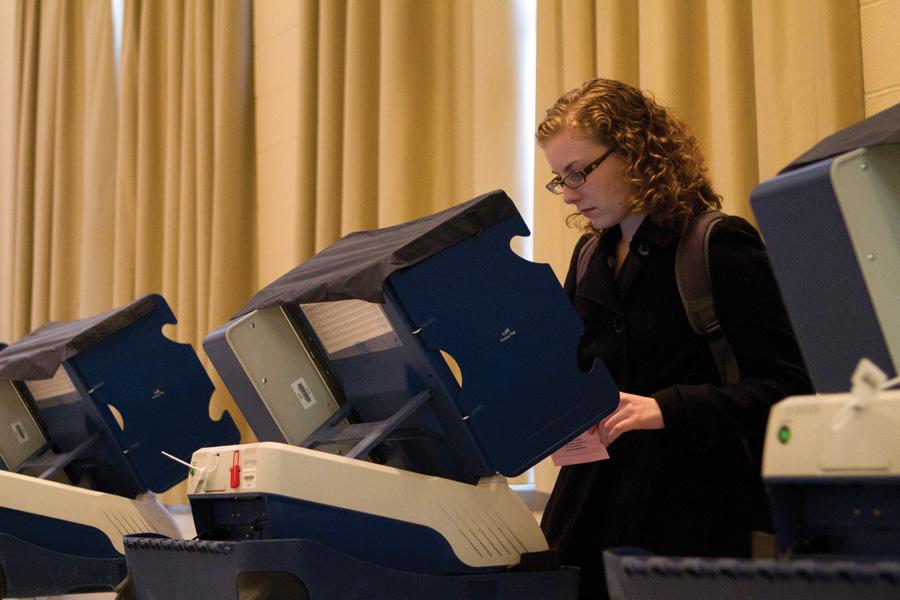New year, new laws: Nine laws affecting Evanston residents in 2023
Daily file photo by Meghan White
Illinois residents voted for the Workers’ Rights Amendment in the 2022 midterm election.
January 6, 2023
Content warning: This article contains mentions of violence and miscarriages.
More than 180 new laws went into effect in Illinois on Jan. 1. Here are nine of the most impactful laws for Evanston residents in the new year.
On Jan. 1, the Illinois minimum wage increased from $12 to $13. The increase, though relatively small, is part of an annual increase that will continue through 2025 and ultimately raise the minimum wage to $15 per hour. Governor J.B. Pritzker signed the legislation in 2019.
For workers who routinely earn tips, the minimum wage increased to $7.80 per hour. However, if tips do not make up the difference for the $13 minimum wage, the employer must cover the rest.
Task Force on Missing and Murdered Chicago Women Act
This new state law creates a task force to examine the causes behind violence against women of all ages in Chicago. The task force’s primary job is to compile data on violent crimes and report these findings to the Illinois General Assembly and the governor. Additionally, it will propose new policies aimed at reducing violence against Chicago women and altering the way these crimes are prosecuted.
In the 2022 midterm election, voters approved a Workers’ Rights Amendment that guarantees government employees the ability to unionize and bargain collectively over employment terms. Supporters of the amendment say it will help workers secure higher pay, better hours and more favorable working conditions.
In Illinois, on Jan. 1, the gas tax increased to 42.4 cents per gallon, a 3.2 cent increase. Officials cited inflation as the reason for the hike. The increase was intended to take place in summer 2022 under a 2019 law, but officials postponed it for six months. There will be an additional raise in the tax starting July 1.
In accordance with Senate Bill 3925, the Illinois Student Assistance Commission will offer some student loan repayment grants. To qualify, applicants must be working for a human services agency funded or contracted by the state. The human services agencies must provide services that assist others with their well-being, such as physical, emotional and economic health.
The law will offer up to $25,000 per year to recipients with a master’s degree and above.
All Illinois school board members will undergo annual training on “trauma-informed practices” going forward under Senate Bill 2109. The trainings will include information on the prevalence of trauma in students and information on how biases related to sexual orientation, socioeconomic status, gender identity, race and ethnicity can cause trauma. The Illinois State Board of Education now mandates these trainings annually under the law.
This law eliminates Illinois’ current cash bail system, which requires defendants to pay a fee in order to wait out trials outside of jail. However, the cash bail system often means in practice that wealthier defendants can post bail while lower-income people cannot. Under the SAFE-T Act, the state would adopt a pretrial release framework that uses decision factors like public safety and flight risk to make bail decisions. Currently, there is a legal battle over the law after an Illinois judge blocked the adoption of the bill.
Increased Reproductive Healthcare Rights
Multiple laws went into place Jan. 1 related to supporting reproductive health.
Senate Bill 3120 says those who have a diagnosis that negatively impacts pregnancy or fertility, or who suffer a miscarriage or stillbirth, can take 10 days of leave.
Under House Bill 5254, health insurance plans must cover hormone therapy treatments for people who have had a hysterectomy that induced premature menopause. This hormone therapy helps prevent medical conditions such as osteoporosis and is therefore considered medically necessary under the law.
Email: [email protected]
Twitter: @nicolejmarkus
Related Stories:
— City Council debates underage drinking, public drunkenness laws at Monday meeting
— Evanston union workers celebrate success of Illinois ‘Workers Rights Amendment’
— Demonstrators gather for rally and march to defend abortion access


